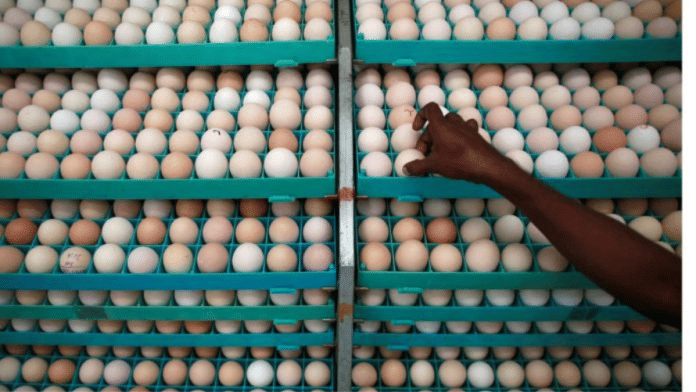Bengaluru: The Siddaramaiah government’s decision to replace eggs with soya chunks in Karnataka-run hospitals has come under sharp criticism from public health experts, who have questioned the science behind such a sweeping move.
“Unless soya has undergone a lot of processes, it is generally a more difficult food to digest. It might have protein content, but most of it is not bioavailable and definitely it’s not as nutritious as animal source foods,” Dr Sylvia Karpagam, an MD in community medicine and public health expert, told ThePrint.
“Whether it’s senior citizens, breastfeeding mothers…all those recovering… they all need better immunity and ability to regenerate tissues. Animal proteins have advantages for sick and recovering patients,” she added.
On Tuesday, Karnatakas health minister, Dinesh Gundu Rao, announced a nine-month pilot programme to serve ‘nutritious’ food to patients in three of Bengaluru’s public hospitals. None of them will include eggs since the contracted party, ISKCON (International Society for Krishna Consciousness), is a Hindu religious organisation. The project will cost over Rs 1.37 crore.
To meet specific nutritional requirements, the government introduced separate diet plans for general, therapeutic, pregnancy, post-natal and pediatric patients.
Madhya Pradesh replaced eggs with milk in 2021. Karnataka has held out despite resistance to serving eggs from parents who want only vegetarian food for children.
Experts argue the decision has caste undertones similar to the refusal to use Indian kitchen staples such as onions and garlic, which they say is an attempt to “homogenise” food habits and align them with those of so-called upper caste groups.
‘Eggs are the only problem’
ISKCON’s Hare Krishna Food for Life (FFL) programme is the world’s largest vegetarian food distribution initiative with projects in over 60 countries.
It serves food in about 23,978 schools (govt and govt-aided) across the country under the Akshaya Patra Foundation-led Mid-Day Meal. The organisation caters to 2.33 million children every day in various states.
According to Union Human Resource Development Ministry (MHRD) guidelines, a mid-day meal for primary school children should provide 450 calories—12 grams of protein, 100 grams of food grains, 20 grams of pulses, 50 grams of vegetables, 5 grams of oil and fat, and salt and condiments as needed.
The protein quotient is where most of the problem lies.
Karnataka health minister Dinesh Gundu Rao told ThePrint that this was only a pilot project in three government hospitals in Bengaluru and that its continuance would depend on patient feedback.
“Earlier, a local contractor used to take it (tender) and they used to do it. The quality was not great, nor was the service. They (ISKCON) will serve, bring everything (utensils) and take it back as well. They have built core competency as they serve mid-day meal schemes,” Rao said. “But eggs are the only problem.”
Though Karnataka is among the top-ranked states in terms of attracting investments and GST collections, it has faced problems with malnutrition among children.
State-wise details of malnutrition indicators for children in the 0-5 age group from Poshan Tracker data in June show 39.05 percent of children in Karnataka were stunted, 3.18 percent wasted and 16.50 percent underweight. This is against a national average of 37.07 percent (stunted), 5.46 percent (wasted) and 15.93 percent (underweight), according to a reply in the Rajya Sabha in July.
Karnataka has shifted positions on including or excluding eggs in the mid-day meal programmes, depending on the government of the day as well as the veto of powerful caste and religion-based lobbies.
‘Why romanticise private sector?’
Rao says that, unlike school children, hospital patients say just a few days and so what matters is that they receive nutritious, hygienic and good food. “So when they (patients) come, we give them good, nutritious food. Anything extra, they are always free to take.”
But several instances of people being picked on for their food choices have enabled the enforcement of ‘vegetarian only’ food options.
In July, a member of a pro-Hindu organisation was arrested for harassing a Blinkit rider and allegedly threatening a store manager of the platform for delivering non-vegetarian items during the holy month of Sawan.
Earlier this year, Trinamool Congress MP Shatrughan Sinha suggested that non-vegetarian food be banned across India.
Food in India is tied to identity, privilege, economic and social standing, among other things. But there have been sustained campaigns to villainise non-vegetarianism as “impure” or “dirty”, experts say.
Karpagam said this kind of forced vegetarianism is a “caste and corporate nexus”.
“This is about some caste, religion and shoving it down the throats of our children and the larger public. Private players are encroaching on public health issues and end up causing some real damage,” Dr Gopal Dabade, head of the Drug Action Forum in Karnataka, said.
He said that eggs should not be seen through the lens of vegetarianism, but rather the nutritional value in addressing growing malnutrition.
Experts warn of an effort to homogenise food, especially that of the poor. Prasanna Saligrama, public health researcher with Sarvatrika Arogya Andolana Karnataka, says there is a “fascination” that the private sector will resolve all quality problems.
“There is some fascination that the private sector is great, but there is nothing being done to fix the government’s own operations. This is like saying that the government cannot do this, but the private sector will do better. Also, this is shifting responsibility and accountability,” he says.
(Edited by Sugita Katyal)
Also Read: CAG alarm on Congress’s Karnataka guarantees sparks debate. Economists point to long-term impact






